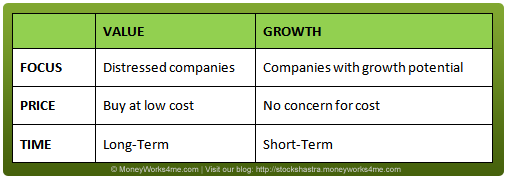Last week, we learnt about the two most popular styles of investing viz. Fundamental and Technical analysis. Over the years, many legends of the stock investing world like Benjamin Graham, Warren Buffet , Peter Lynch have helped develop or popularized some stock investing strategies based predominantly on fundamentals. In today’s article we will learn more about these strategies. So, let’s begin with the well-known strategy of Value Investing.
VALUE INVESTING:
Derived & developed by Benjamin Graham & David Dodd in the 1930s and then popularized by the legendary Warren Buffet, this approach sees investors opting for stocks which seem to be undervalued with respect to some fundamental parameters.
One of the main distinguishing characteristics of value investors is that they usually end up doing the opposite of the rest. When the bulk is going into stock shopping overdrive, this one turns to selling. On the other hand, when the flocks get jittery and start to bail on a particular stock, it’s a signal for these investors to start buying.
Value investors pay attention to factors like high dividend yields and low P/E ratios, but the selection of companies is based on certain criteria:
- The business makes long-term sense
- It has a competitive edge
- It has trustworthy and growth-oriented management
- The stock can be bought at a discount price
A good example of the value investing strategy would be Tata Steel.
Since some criticize this method by saying there’s no surety in the estimate of worth, a value investor uses a margin of safety. Buying at a great bargain ensures that if the stock’s a miss, the blows won’t be too hard.
GROWTH INVESTING:
Here the investor looks for stocks with growth potential. The focus is on newer and expanding companies which are likely to rake in the profits at some point in the future at an exponential rate; much higher than the industry or the market. This strategy yielded exponential returns to investors in the 1990s, during the dotcom bubble, when technology stocks were in a growth phase!
Growth investors believe that a company which re-invests into bettering its business is one that is bound to flourish. There are of course some factors to consider in the short listing of a growth company.
- The company should be able to grow substantially faster than others
- Should be from rapidly expanding industries especially those related to new technology
- Profits are realized through capital gains and not dividends as nearly all growth companies reinvest their earnings and do not pay a dividend
A good example of the growth investing strategy is Jubilant Foodworks.
The downside to this method is that growth investors don’t pay much heed to the buying price of stock. So if an investment should go bad, they could be left with a more than sizeable loss.
Value and Growth investing – A comparison:

GARP Strategy:
Value and growth investing are two entirely different approaches to stock selection, yet a well-known investor, Peter Lynch created a new strategy by combining the two.
Growth at Reasonable Price (GARP) investors look for companies that are showing consistent earnings growth above broad market levels (a tenet of growth investing) while excluding companies that have very high valuations (value investing).
The Biocon stock proves to be a perfect example for the GARP strategy.
The criteria which GARPers thus look for in a company fall right in between those sought by the value and growth investors.
To Conclude:
There have been numerous studies on the subject of value versus growth investment strategies done for the US stock markets. These studies included comparison of value portfolios (stocks with the lowest P/E, P/BV, etc.) to growth portfolios (stocks with the highest P/E, P/BV, etc.) to judge which portfolios had given better returns.
The result was that value portfolios had outperformed the growth portfolios in all of the studies. Infact, in some of them the value portfolios were compared to a benchmark index and it was seen that they had outperformed the benchmark index as well.
Concluding, it’s important to remember that stock investing offers different strokes for different folks. Once you’ve identified your investment goals and personality, you can choose and stick with the style that speaks for you best. However, history shows that value investing has tended to be a more profitable way to invest in stocks.
We at MoneyWorks4me.com also believe that by adopting value investing principles, investors can significantly reduce the risk associated with investing in stocks and maximize their returns. So, do go ahead and check out which stocks offer value currently on MoneyWorks4me.com
Which stock investing strategy would you go for? And which stocks do you think currently are the best value, growth or GARP buys? Do comment and let us know.
If you liked what you read and would like to put it in to practice Register at MoneyWorks4me.com. You will get amazing FREE features that will enable you to invest in Stocks and Mutual Funds the right way.
|
VALUE |
GROWTH |
|
|
FOCUS |
Distressed companies |
Companies with growth potential |
|
PRICE |
Buy at low cost |
No concern for cost |
|
TIME |
Long-Term |
Short-Term |
Need help on Investing? And more….Puchho Befikar
Kyunki yeh paise ka mamala hai
Start Chat | Request a Callback | Call 020 6725 8333 | WhatsApp 8055769463










